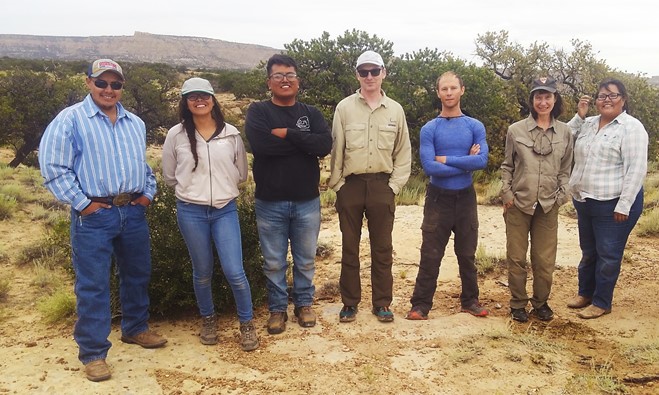Northern Arizona University is part of a multiyear collaborative effort with Navajo Technical University (NTU) and the U.S. Forest Service to understand the status of pinyon-juniper woodlands and develop restoration techniques. Pinyon pines, which are culturally and ecologically important throughout the Southwest, including the Navajo Nation, have experienced widespread mortality owing to ongoing drought conditions and other factors.
Increasing heat and aridity have also reduced seed production. However, recent research demonstrates that individual pinyon trees vary greatly in their ability to survive and reproduce during prolonged droughts. Identifying drought-tolerant trees and collecting their seeds have become increasingly urgent as drought conditions continue.
“We will use ground- and remote-sensing data to determine how pinyon-juniper woodlands have been affected by climate change and cutting for fuelwood at a landscape-level scale,” said the project’s co-principal investigator, Amy Whipple, an associate professor of biological sciences and a member of the Center for Adaptable Western Landscapes (CAWL). “Importantly, this project will integrate data collected by the Navajo Forestry Department, Bureau of Indian Affairs and Forest Service in an effort to make our results more useful to Navajo Nation land managers.”
The research team will use the findings to project future pinyon-juniper woodland distributions and identify the trees that can serve as seed sources for restoration efforts. The overarching goal is to develop methods, resources and plans for restoration using the findings.
The seeds of the pinyon pine, or piñón nuts, are edible, and the trees are culturally important to Native Americans. Both pinyon and juniper trees are used for fuelwood on the Navajo Nation. Cutting of both species may be accelerating with the curtailment of coal mining operation, which provided coal for heating.
“Through collaboration, the project ensures that Native American perspectives on natural resource protection and management are central to developing responses to the impacts of climate change,” said Steve Chischilly, the project’s principal investigator and associate professor of environmental science, Navajo Technical University. “The project also provides important training opportunities for our students and builds understanding among entities working with Native American communities.”
The U.S. Department of Agriculture has awarded grants to Navajo Technical University, with NAU subcontracts, annually since 2016. The Forest Service will share its Forest Inventory and Analysis data and expertise in remote sensing and modeling plant distributions. NAU will provide training to NTU students in forest survey methods and remote sensing data and geographic information systems analyses.
Original funding helped to establish an experimental forest at Crown Point, New Mexico, and add to an NAU experimental forest near Sunset Crater. Using these sites, the project will develop techniques for germination, growth and inoculation with beneficial soil microbes to improve restoration outcomes.
“This project is very exciting because it builds on long-term efforts by NAU and NTU researchers to understand how plant communities and soil fungi interact and respond to changing conditions,” said Catherine Gehring, Lucking Family Professor of biological science, a co-principal investigator for this project and a CAWL co-director. “It is very gratifying to think that NAU research may help to successfully restore pinyon-juniper woodlands in the Southwest.”
The Center for Adaptable Western Landscapes, or CAWL, established in May, is one of NAU’s newest research centers. It was created to promote robust scientific research to enhance sustainable management of ecological populations, communities and landscapes, and to develop solutions to ecological problems in the American Southwest and Colorado Plateau.
Lara M. Schmit
Center for Adaptable Western Landscapes




